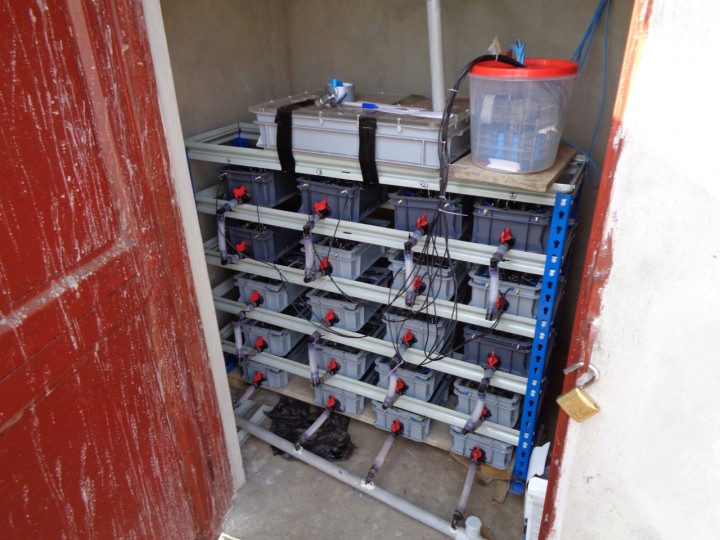Urine-tricity: Electricity from urine
2011 - 2018 • University of the West of England, Bristol Robotics Laboratory (BRL)
Purpose
To scale down the size and improve the performance of microbial fuel cell (MFC) technology in order to further opportunities to implement this technology to address energy access issues in developing countries
Activities
Phase 3 involves further research into and optimisation of the MFCs in terms of wastewater treatment, electricity generation and other benefits (e.g. pathogen killing and disinfectant production), taking the technology forward towards commercialisation, and setting up field trials in developing country locations where they lack sanitation infrastructure and electricity access. The first field trial is being installed in Uganda. A partnership with Oxfam (since 2016) relates to setting up further trials in refugee camps.
Images

Image: Pilot project in Kisoro, Uganda
Countries of activity
Location of main activity
Objectives
Generating electricity directly from urine, using Microbial Fuel Cells (MFC). MFC is an energy transducer, with live (non-pathogenic) microorganisms that serve as bio-catalyst.
The Objectives under Phase 3 include bringing the MFC technology closer to the market, so it can be commercialised and made available primarily for developing country contexts which lack sanitation infrastructure and electricity access. Continued lab research and field-based trials will underpin demonstrations and optimisation of the various real world applications of the technology.
Further information
The MFC is an energy transducer, with live (non-pathogenic) microorganisms as the bio-catalyst. It consists of two half-cells:- an anode (negative terminal) and a cathode (positive terminal) that are typically materialized in two different chambers. Microbes typically grow on the anode and continue with their normal metabolic processes. In the presence of an electrode and under the pressures of redox potential difference and consequent electrophilic attraction, they interact with the electrode and make it part of their natural anaerobic respiration, i.e. directly or indirectly transfer electrons onto the electrode.
Microorganisms inside the anode of an MFC form a biofilm of fixed thickness, dictated by the ability and rate of electron transfer for respiration. These microorganisms form a stable semi-solid matrix onto the electrode surface, which becomes permanently stuck, robust and resistant, even at high flow rates. New daughter cells or other microbes, which have no access to the electrode, will remain in the anode until being flushed out.
A very important feature of MFCs is the inherent link between electricity generation and waste (sludge or urine) break-down. This means that the higher the energy output levels, the better is the waste compound breakdown and the higher is the production of water at the cathode [2 incoming electrons and 2 protons per single water molecule].
Different approaches can be employed for optimizing the MFC technology to allow scale up for practical applications. In particular, it has been shown that higher energy density levels and optimum biofilm/electrode surface area–to–volume ratios reside within smaller scale MFCs, so this is the direction the project is moving in.
Contact information
Gill Davies
Login to see the e-mail-adress of the contact person.
Filter tags
Bill & Melinda Gates Foundation Europe & Central Asia Fundamental research and engineering Product design and engineering Renewable energies and climate change Resource recovery Sub-Saharan Africa
Links

Uploaded by:
Trevor Surridge (tmsinnovation)















